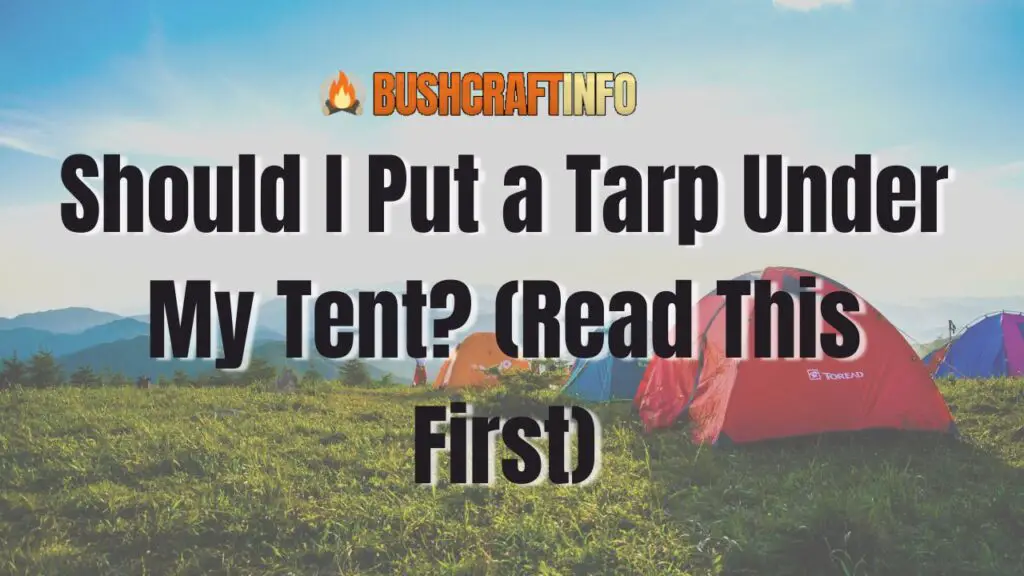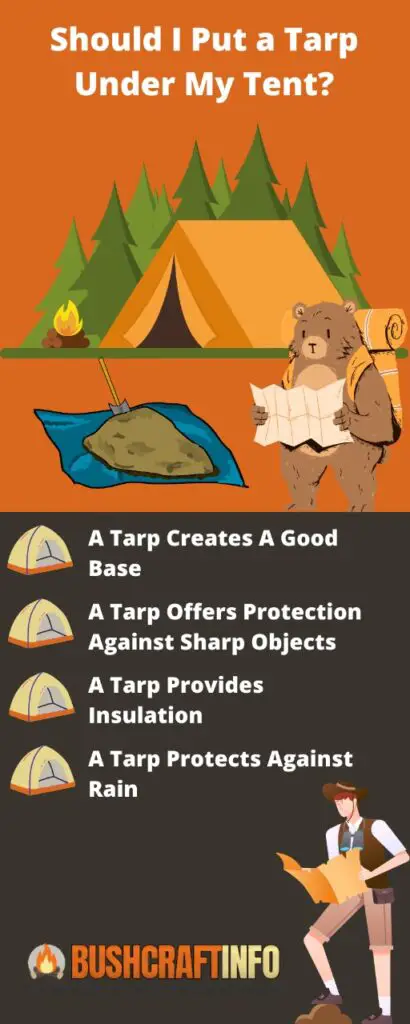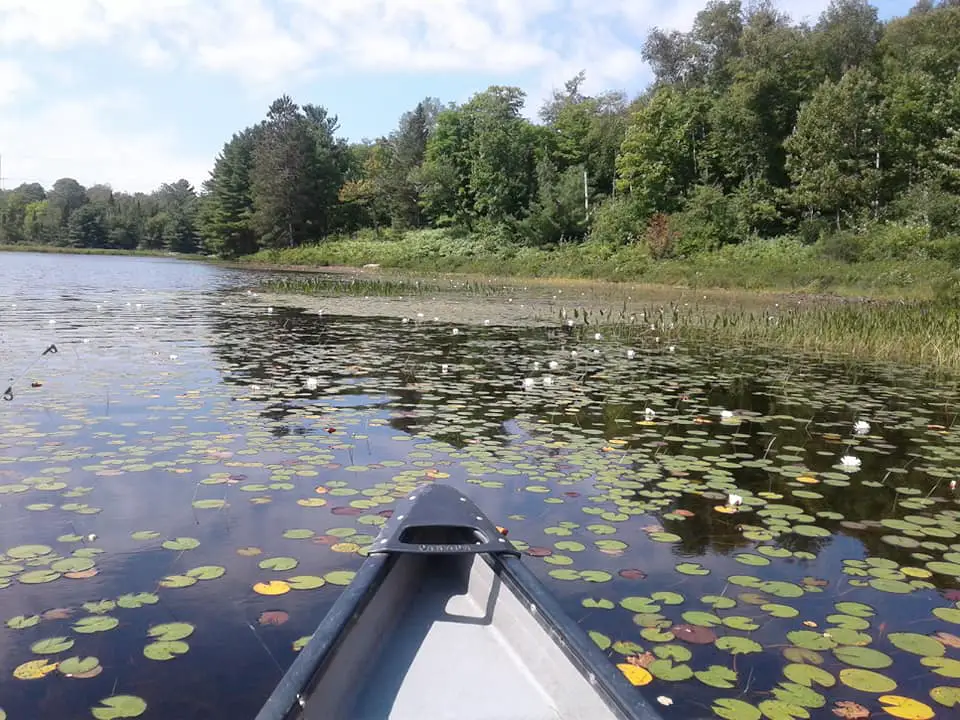One of the most common questions that almost every beginner may have on their mind is: Should I put a tarp under my tent?
Yes, you should always place a tarp under your tent if possible. A tarp beneath the tent has several advantages. First, it makes a good base and protects the floor of your tent from becoming wet or muddy.
In case you are camping in an area where there is a risk of flooding or it is raining, putting a tarp under your tent can also help to keep you dry.
However, that’s only one of the reasons you should use a tarp. There are several other advantages of using a tarp under your tent. If you are interested in learning why should you always use a tarp, read on!

What Is The Purpose Of A Tarp Under A Tent?
Like I said before, a tarp placed under your tent can help to keep the floor of your tent clean and dry. In addition, it also offers protection against any sharp objects that may be present on the ground.
If you are camping in an area with a lot of trees, there is always a risk of falling branches or debris. A tarp placed under your tent can help to protect you from these falling objects.
Another purpose of a tarp is to provide insulation. If you place a tarp under your tent, it will help to keep the ground cooler in summer and warmer in winter. This can be extremely beneficial if you are camping in an area with extreme temperatures.
Advantages Of Using A Tarp Under Your Tent
There are several advantages of using a tarp under your tent, some of which are listed below:
1. A Tarp Creates A Good Base:
One of the main reasons you should put a tarp under your tent is that it creates a good base. This is especially important if you are camping in an area with a lot of trees or where there is a risk of flooding. A tarp beneath the tent will protect the floor of your tent from becoming wet or muddy.
2. A Tarp Offers Protection Against Sharp Objects:
Another advantage of using a tarp is that it offers protection against sharp objects that may be present on the ground. If you are camping in an area with a lot of trees, there is always a risk of falling branches or debris. A tarp placed under your tent can help to protect you from these falling objects.
3. A Tarp Provides Insulation:
Another purpose of a tarp is to provide insulation. If you place a tarp under your tent, it will help to keep the ground cooler in summer and warmer in winter. This can be extremely beneficial if you are camping in an area with extreme temperatures.
4. A Tarp Protects Against Rain:
If you are camping in an area that is prone to rain, a tarp can help to protect your tent from getting wet. The tarp will act as a barrier between the ground and your tent, preventing rainwater from seeping through.

How Thick Should A Tarp Be Under A Tent?
Now that you already know it is wise to keep a tarp under the tent, you might be wondering how thick it should be?
Ideally, the tarp should be at least 6 mils thick. This thickness will offer enough protection against any objects that may fall from above and also provide adequate insulation.
However, if you are using a tarp for the purpose of providing insulation only, you can go for a thinner tarp. A 4 mil thick tarp will be sufficient in this case. Having that said, you should always keep in mind that the thicker the tarp is the heavier will be your luggage.
Therefore, you will need to think from different angles when choosing a tarp specifically for under the tent.
What Are The Different Types Of Tarps Available?
When it comes to tarps, there is a wide range you can choose from. The most common tarps used for camping purposes are polyethylene and nylon tarps.
Polyethylene tarps are made from a type of plastic and are very popular among campers. They are very strong and provide more waterproofing as compared to any other tarpaulins.
On the other hand, nylon tarps are made from a strong fabric but aren’t as durable as polyethylene tarps. Apart from that, they are a little bit expensive and heavy as well!
Can You Put A Tarp Directly On A Tent?
So far you’ve learned about the benefits of putting a tarp underneath your tent. But what if it is raining? Can you put a tarp directly on a tent?
The answer to this question is yes, you can put a tarp directly on a tent either with the help of mounting poles or nearby trees. Putting a tarp directly over your tent will help provide extra protection against the rain and snow.
However, putting a tarp directly over your tent may require a little bit of extra skill as compared to putting it under. It is because tarps are not breathable and due to this it traps the air beneath them.
Under such conditions, if the wind is strong, then you will need to secure the tarp perfectly. Otherwise, it can pluck the poles from the ground. Apart from that, it can also break tree branches sometimes, so you will need to be very careful with it.
When Should You Avoid Putting A Tarp Under The Tent?
So far so good, we learned the pros of putting a tarp as a base for the tent. However, there are times when you should avoid doing so. Let’s have a look at those situations:
1. When The Ground Is Already Dry And Clean:
If you are camping on a grassy field or any other place where the ground is already dry and clean, then there is no need to put a tarp underneath your tent. This is because there is nothing to harm your tent on such grounds mostly.
2. When It Might Rain But Not For Long:
There are times when you know it might rain, but the rain is not going to be heavy or long-lasting. In such cases, it is better to avoid putting a tarp under your tent and save yourself from the hassle.
3. When You Are Using A Groundsheet:
If you are using a groundsheet, then there is no need for a tarp as well. The groundsheet will already protect your tent from moisture and dirt. However, you will need to make sure that the sheet is good enough to replace a camping tarp.
How To Pick The Right Tarp To Put Under Your Tent?
Choosing the right kind of tarp is also a basic skill that every bushcrafter must learn and master. Let’s have a look at the main factors that you need to consider while picking a tarp:
1. The Size Of The Tarp:
The most important factor to consider while choosing a tarp is its size. You will need to make sure that the tarp you are picking is big enough to cover the entire area of your tent.
2. The Weight Of The Tarp:
Another factor to consider is the weight of the tarp. As we discussed earlier, tarps are available in different materials and thicknesses. The heavier the tarp is the more difficult it will be to carry around.
Therefore, you need to make sure that you are picking a tarp that is lightweight and easy to carry.
3. The Material Of The Tarp:
The material of the tarp is also an important factor to consider while picking one. As we discussed, tarps are available in different materials like polyethylene, nylon, etc. Each material comes with its own set of pros and cons.
Therefore, you need to make sure that you are picking a tarp made up of a material that is suitable for the kind of camping you are going to do.
4. The Price Of The Tarp:
The price of the tarp is also an important factor to consider while picking one. Tarps are available in different price ranges. The cheaper ones are mostly made up of polyethylene while the expensive ones are mostly made up of nylon.
You need to make sure that you are picking a tarp that is affordable and also meets your other requirements.
5. The Shape Of The Tarp:
Tarps are available in different shapes like rectangular, square, and triangular. The shape of the tarp you are picking should be according to the shape of your tent.
For example, if you have a rectangular tent then it is better to pick a rectangular tarp. This is because it will cover the entire area of your tent perfectly.
Conclusion:
In this article, I tried to answer one of the most frequently asked questions on different forums i.e. Should I put a tarp under my tent? To conclude the above article, yes, it is always a good idea to put a tarp under the tent.
The thickness of the tarp should be somewhere around 4 to 6 mm depending upon the area and the weather condition. Besides that, you should also set one right on top of the tent if possible as it will provide a solid cover against snow and rain.
I hope you’ve enjoyed reading this article and found it helpful. Thank you so much and don’t forget to leave feedback.
Was this post helpful?

Hey I’m Josh! I have been practicing Bushcraft for a little over 6 years now! I Started this website to review awesome bushcraft gear that I love as well as share information I have learned along the way!


